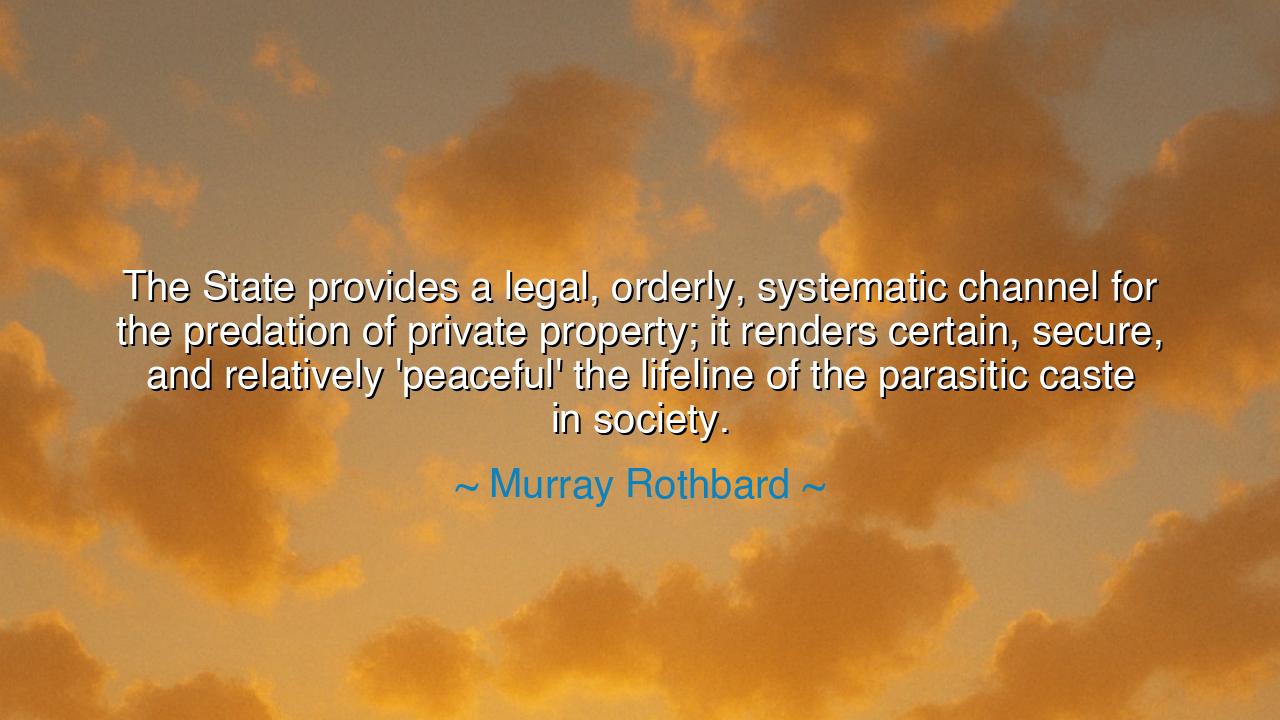
The State provides a legal, orderly, systematic channel for the
The State provides a legal, orderly, systematic channel for the predation of private property; it renders certain, secure, and relatively 'peaceful' the lifeline of the parasitic caste in society.






Hear the thunderous words of Murray Rothbard, spoken as a judgment against the powers of this world: “The State provides a legal, orderly, systematic channel for the predation of private property; it renders certain, secure, and relatively ‘peaceful’ the lifeline of the parasitic caste in society.” These words cut like a sword, laying bare the nature of political power. For Rothbard tells us that what men call government is not always the protector of the people, but oftentimes the most cunning predator, cloaking its plunder in the garments of law, and calling theft by the name of order.
The heart of his teaching is that the State, unlike the brigand who robs by night, robs in daylight with the sanction of legality. The thief risks his life in chaos, but the State extracts with forms and signatures, with decrees and taxes, rendering its predation “systematic” and therefore invisible to many. Thus Rothbard warns us that power, once institutionalized, becomes more dangerous than crime itself, for it convinces the people that their own submission is duty, and that the lifeblood drained from their labor is justice.
History offers countless proofs. Consider the feudal system of medieval Europe. The serf tilled the soil, bent beneath sun and toil, yet much of his crop was taken by lord and king in the name of law and custom. He was told this was his place, that the tithe and tax were for his protection, though the sword of the State more often defended the privileges of the few than the lives of the many. This was not robbery by chance, but a legal channel of predation, sanctified by tradition and enforced with unyielding strength.
Another tale rises from more recent times: the collapse of the Russian peasantry under the czars and later the commissars. In both regimes, the fruits of labor were seized under banners of order—first for the nobility, then for the Party. Though the names changed, the people remained yoked, their private property dissolved into the maw of the State. The “parasitic caste” was preserved, though its clothing shifted from aristocratic robes to revolutionary slogans. Thus Rothbard’s teaching is universal, applying not only to monarchies of old but to the modern empires of bureaucracy.
Yet his words are not only lamentation but also a call to awareness. He declares that the certainty and peace offered by the State are illusions. For what is “peace” if it is the peace of the drained and conquered? What is “order” if it is the order of submission? True peace can only come when property, the fruit of one’s labor, is secured not by decree but by freedom, and true order arises not from compulsion but from voluntary cooperation among free men.
The lesson, then, is twofold. First, be not deceived when rulers claim necessity as justification for their endless extraction. Question always whether law serves liberty or merely disguises theft. Second, guard the fruits of your labor as sacred, for to surrender them without thought is to surrender your dignity itself. Even if the State stands as a giant, its strength is drawn from the consent of the governed; and when the governed awaken, the giant loses its lifeblood.
Therefore, beloved listener, remember Rothbard’s warning: the greatest predator is not the outlaw in the shadows, but the ruler enthroned, who drains with one hand while blessing with the other. Resist with vigilance, live with independence, and hold sacred the bond between labor and reward. In this way, you may walk not as prey for the parasitic caste, but as a free soul who refuses to bow to legalized plunder. For freedom is not given—it is kept, guarded, and passed down, a flame that must never be extinguished.






AAdministratorAdministrator
Welcome, honored guests. Please leave a comment, we will respond soon